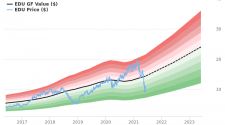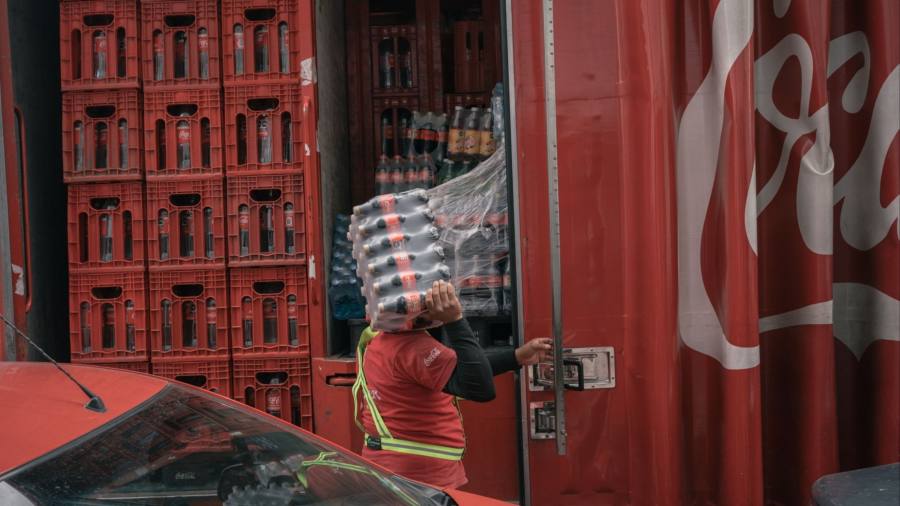Coca-Cola has increased its use of newly manufactured plastic by 3.5 per cent since 2019, casting doubt over its ability to cut ‘virgin’ plastic use and heaping more pressure on the world’s largest soft drinks group as it prepares to sponsor the COP27 UN climate summit.
Data from the Ellen MacArthur Foundation, which has drawn together a group of multinationals in a “global commitment” to cut plastic waste, show that Coca-Cola, PepsiCo and Walmart were among the worst offenders increasing virgin, non-recycled plastic use in 2021.
Companies will need to “exponentially” increase their use of recycled plastic to reach an aggregate target of 26 per cent recycled content by 2025, the foundation said, after they collectively lifted their use of virgin plastic back to 2018 levels.
As part of the push to cut pollution and emissions, the companies are also targeting 100 per cent reusable, recyclable, or compostable packaging by 2025, which the foundation said was “becoming unattainable for most signatory businesses”.
“All their great progress [on increasing the use of recycled plastic] has been completely undone by the sheer growth of their overall packaging use,” said Sander Defruyt, who leads the New Plastics Economy Initiative at the foundation. “It’s another illustration of the fact that we will not recycle our way out of this.”
The choice of Coca-Cola as a sponsor for the COP27 climate summit in Egypt this month has faced opposition from climate activists, as it is one of the world’s largest plastic polluters. It also faces pressure over recycling from activist investor Engine No. 1. Over the 2019 to 2021 period, Coca-Cola’s total plastic use increased 8.1 per cent to 3.2mn tonnes.
Georgia Elliott-Smith, managing director of sustainability consultancy Element Four and founder of an online petition with 235,000 signatures for the company to be ousted as a sponsor, said the increase in the use of virgin plastic was “another failure by Coke to keep their promises”.
“For over 30 years, they have left a trail of missed targets and abandoned pledges,” she said, adding that the sponsorship enabled them to “greenwash their brand”.
Coca-Cola said it was “committed to do more, faster so we grow our business the right way. We are focused on continued action across our goals, including making 100 per cent of our packaging recyclable globally by 2025.” It said the figure was currently at 90 per cent. It is also seeking to cut virgin plastic use by a fifth during the same period.
Coca-Cola added that its “support for COP27 is in line with our science-based target to reduce absolute carbon emissions 25 per cent by 2030, and our ambition for net zero carbon emissions by 2050”.
Among the largest users of plastic packaging taking part in the Ellen MacArthur Foundation’s initiative, PepsiCo increased its use of virgin plastic by 4.5 per cent in 2021 from the previous year, while Walmart raised its use by 3.4 per cent over the same period. Other big consumer goods groups, such as Unilever, Danone and Nestlé, reduced theirs, however.
The use of “flexible” packaging such as sachets and films, which are difficult to recycle, is a particular problem, the foundation said.
Defruyt said greater regulation — such as a planned global treaty on plastics — and better recycling infrastructure were needed to accelerate progress, along with greater investment in reuse rather than recycling schemes.
Nestlé said it had passed peak virgin plastic use despite the growth of its business. But it said one challenge was food safety: “Food packaging is vital for protecting food against external influences such as moisture, heat, light, microbes or bacteria . . . plastic has made food safer.”
Walmart said it remained “committed to our goal of achieving zero waste in our global operations . . . We ask suppliers to eliminate unnecessary packaging and plastics as the first step and, where plastic is needed, we design for recyclability.”
Climate Capital

Where climate change meets business, markets and politics. Explore the FT’s coverage here.
Are you curious about the FT’s environmental sustainability commitments? Find out more about our science-based targets here



















